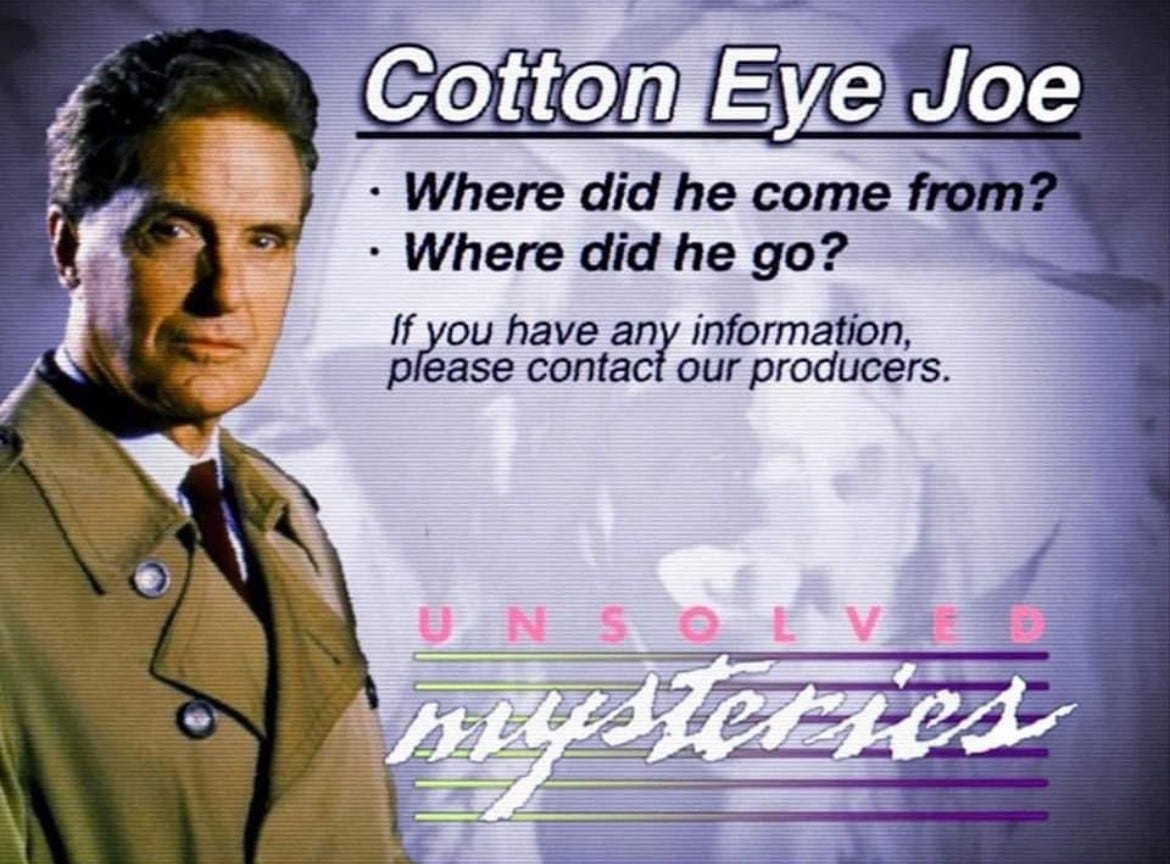Texas Hold'em is temporary, Cotton Eye Joe is forever
The story behind the song may be just as wild as the story of Cotton Eye Joe himself.
First things first: I absolutely HATE that 90's version of the song, but I'd rather listen to that than the viral pop quasi-country that's taken the Internet in the last weeks. Nevertheless, I did as I said, and while I sat bored at the airport a few days back, I went down the rabbit hole and found out that 'Cotton Eye Joe' is actually a pretty wicked song! What surprised me most is that it is really old - its beginnings pre-date the Civil War (so we're talking early 1800s!). I urgently needed to know more - who the hell is Joe, where did he come from and, most importantly, where did he go? And here's what I learned.
The song originated a long time ago
Although the origins of this song are unclear, American folklorist Dorothy Scarborough noted in her 1925 book On the Trail of Negro Folk-songs that several people remembered hearing the song before the Civil War.
It was typically played on banjo or fiddle and circulated through the southern states, especially amongst enslaved communities, as a song to sing and dance along to, and it was passed down orally. The first known published version of “Cotton Eye Joe” appeared in Diddie, Dumps, and Tot, or Plantation Child-Life, an 1882 children’s book about the South:
“Ef it hadn’t ben fur Cotton-eyed Joe, I’d er ben married long ergo.”
There's also another mention of the folk song in the 1922 book Negro Folk Rhymes by Thomas W. Talley: “I’d a been dead some seben years ago / If I hadn’t a danced dat Cotton Eyed Joe'', which indicates that people indeed danced to this song. It was also featured in an 1875 issue of The Saturday Evening Post and in The Firemen’s Magazine in 1884.
The earliest known version of a recorded song comes from 1927 by the band Dykes Magic City Trio, but it was in 1941 when Bob Willis and His Texas Playboys popularized it in the US.
Where did he come from?
But what about Joe itself - who was he, and where did he come from? The mysterious villain, named Cotton Eyed Joe, whose origins and actions (as well as his perception) differ depending on the version. One thing is clear though - whoever wrote or performed the song, surely had a beef with Joe about something.
In The Negro Traditions, a book published in 1993, he is a fiddler whose instrument was made from his dead son’s coffin. Other sources depict him as a devil or a trickster, and in 1959's Nina Simon's version, he's basically what Clint Eastwood represented in his westerns:
He came to town like a midwinter storm
He rode through the fields so
Handsome and strong
But in the 1882 version, the first published one, he's portrayed rather differently:
His eyes wuz crossed, an' his nose wuz flat,
An' his teef wuz out, but wat uv dat?
In most of the cases, Joe comes from the Deep South during a shameful period in American history.
Why cotton-eyed?
There is much debate as to what “cotton eye” actually refers to and a lot of theories about what it really means. Some believe that it means to be drunk on moonshine - homemade illicit liquor believed to make people lose their minds or even go blind. Others think that it refers to the contrast between dark skin and white eyeballs. Some historians, however, believe it might have had a derogatory meaning related to the appearance of Black people, particularly those enslaved on plantations. This theory is connected to the song's origins in the antebellum South. No true definition has ever been confirmed.
Where did he go?
Well, looks like whoever came up with the 'Cotton Eye Joe' surely deserves some kind of award - the song's been around for generations, and it isn't going nowhere. There are at least 130 noted recordings of the song since the 1950s, it has been used in various movies and covers and it's widely known across the planet.
Last year, my mum's kindergarten class performed a line dance at a local school fair and guess what - they won! Neither the kids nor my mum had any idea about the meaning of the song (we're talking rural Poland), but that didn't stop them from enjoying it anyway, which was usually the goal of folk songs in the first place.






